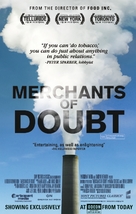Reviews provided by RottenTomatoes
Sara Stewart, New York Post: Tobacco companies have fallen far in recent years, but this zingy documentary explores how very high their p.r. machines set the bar for public misdirection. Read more
Justin Chang, Variety: This is a movie so intrigued by its designated villains that it almost conveys a perverse form of admiration, and the fascination proves contagious. Read more
Ignatiy Vishnevetsky, AV Club: In this glossy informational mode of filmmaking, organization is everything, and director Robert Kenner (Food, Inc.) isn't much of a storyteller. Read more
Boston Globe: Subtle, it's not. But it is effective. Read more
J. R. Jones, Chicago Reader: The jury's back in on the PR hacks who sow confusion and manufacture ambiguity in the public debate over climate change: they're guilty of crimes against not only science and their fellow citizens but humanity itself. Read more
Peter Rainer, Christian Science Monitor: The fact that some of these spinmeisters proudly base their method on the machinations of tobacco-industry lobbyists is doubly damning. Read more
Tom Long, Detroit News: Aside from an eye-opening investigation of useless and harmful flame repellents pumped into furniture, it sticks to climate change without broadening its scope to other examples of corporate spinning, which must be plentiful. Read more
Kevin P. Sullivan, Entertainment Weekly: There are times when it feels as if the film's selected anecdotes are only scratching the surface of a greater evil, but what does make it to screen is intelligent, vital, and enraging. Read more
Stephen Farber, Hollywood Reporter: There isn't a tremendous amount of new information in this generally well-crafted documentary. But it makes a potent, urgent case against the merchants of doubt who play games with the planet's future. Read more
Kenneth Turan, Los Angeles Times: It may sound like a standard-issue advocacy documentary concerned, as so many are, with the perils of global warming, but it's a lot more than that. Read more
Rafer Guzman, Newsday: A compelling expose of professional propagandists, though the movie itself is not agenda-free. Read more
Stephen Whitty, Newark Star-Ledger: A great primer on how corporate propaganda works now, in the age of 24-hour news channels addicted to "debate" when there is none and "controversy" where none exists. Read more
Joe Neumaier, New York Daily News: Shows how a bunko artist is a bunko artist, whether on a corner or on CNN. Read more
A.O. Scott, New York Times: Informative and infuriating ... Read more
Steven Rea, Philadelphia Inquirer: Merchants of Doubt shouldn't be a hard sell. The fact that it is should make you very mad. Read more
Moira MacDonald, Seattle Times: You leave "Merchants of Doubt," as you do any good muckraking documentary, both fascinated and enraged ... Read more
David Lewis, San Francisco Chronicle: When (and before) the end credits roll, you will probably feel a sense of outrage - and helplessness. Read more
Colin Covert, Minneapolis Star Tribune: Using images from sidewalk three-card Monte games, Kenner shows how often people can be suckered for their cash. His film demonstrates that professional cons are much, much bigger. Read more
Joe Williams, St. Louis Post-Dispatch: A movie about manufactured consensus would be a vital public service. But "Merchants of Doubt" isn't quite that movie. Read more
Peter Howell, Toronto Star: To quote one damning corporate memo seen in the film: "Doubt is our product." Read more
David Ehrlich, Time Out: The slickness of Kenner's presentation ironically distracts from the meat of his expose. Read more
Alan Scherstuhl, Village Voice: This material might be familiar to Frontline viewers and magazine readers, but Kenner's telling of the stories proves independently dramatic ... Read more
David Edelstein, New York Magazine/Vulture: What Merchants of Doubt makes clearest is that these issues shouldn't be political. Read more
Ann Hornaday, Washington Post: When "Merchants of Doubt" isn't making you mad, it makes you very simply, and overwhelmingly, sad. Read more
Joe Morgenstern, Wall Street Journal: [It] means to make people angry, and to make them think. It will surely do the former. I'd like to think it will do the latter. Read more

